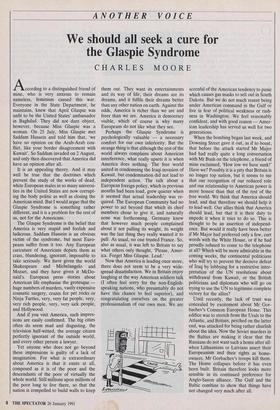ANOTHER VOICE
We should all seek a cure for the Glaspie Syndrome
CHARLES MOORE
It is an appealing theory. And it may well be true that the doctrines which prevent the study of the works of dead, white European males in so many universi- ties in the United States are now corrupt- ing the body politic as well as closing the American mind. But I would argue that the Glaspie Syndrome is something rather different, and it is a problem for the rest of us, not for the Americans.
The Glaspie Syndrome is the belief that America is very stupid and foolish and ludicrous. Saddam Hussein is an obvious victim of the syndrome, but most Euro- peans suffer from it too. Any European caricature of Americans depicts them as crass, blundering, ignorant, impossible to take seriously. We have given the world Shakespeare and Michelangelo and Mozart, and they have given it McDo- nald's. European press stories about American life emphasise the grotesque huge numbers of murders, vastly expensive cosmetic surgery, crazes for pet rocks or Ninja Turtles, very, very fat people, very, very rich people, very, very sick people, and Hollywood.
And if you visit America, such impres- sions are easily confirmed. The big cities often do seem mad and disgusting, the television half-witted, the average citizen perfectly ignorant of the outside world, and every other person a lawyer.
Yet anyone who does not go beyond these impressions is guilty of a lack of imagination. For what is extraordinary about America is that it exists at all, composed as it is of the poor and the descendants of the poor of virtually the whole world. Still millions upon millions of the poor long to live there, so that the nation is compelled to build walls to keep them out. They want its entertainments and its way of life; their dreams are its dreams, and it fulfils their dreams better than any other nation on earth. Against the odds, America is richer than we are and freer than we are. America is democracy visible, which of course is why many Europeans do not like what they see.
Perhaps the Glaspie Syndrome is psychologically valuable — a necessary comfort for our own inferiority. But the strange thing is that although the rest of the world always complains about American interference, what really upsets it is when America does nothing. The free world united in condemning the Iraqi invasion of Kuwait, but condemnation did not lead to independent action. The talk about a European foreign policy, which in previous months had been loud, grew quieter when it seemed that actual leadership was re- quired. The European Community had no power to act beyond that which its chief members chose to give it, and naturally none was forthcoming. Germany knew that however much people complained about it not pulling its weight, its weight was the last thing they really wanted it to pull. As usual, no one trusted France. So, also as usual, it was left to Britain to say what others only thought, 'Please, Amer- ica. Forget Miss Glaspie. Lead.'
Now that America is leading once more, there does not seem to be a very wide- spread dissatisfaction. We in Britain enjoy laughing at the way American soldiers talk (I often feel sorry for the non-English- speaking nations, who presumably do not have this chance to feel superior), and congratulating ourselves on the greater professionalism of our own men. We are scornful of the American tendency to panic which causes gas masks to sell out in South Dakota. But we do not much resent being under American command in the Gulf or live in fear of political weakness or rash- ness in Washington. We feel reasonably confident, and with good reason — Amer- ican leadership has served us well for two generations.
When the bombing began last week, and Downing Street gave it out, as if to boast, that before the attack started Mr Major had had really quite a long conversation with Mr Bush on the telephone, a friend of mine exclaimed, 'How low we have sunk!' Have we? Possibly it is a pity that Britain is no longer top nation, but it seems to me that our recognition of our reduced role and our relationship to American power is more honest than that of the rest of the free world. We think that America should lead, and that therefore we should help it to lead well. Our allies think that America should lead, but that it is their duty to impede it when it tries to do so. This is thought to be an assertion of independ- ence. But would it really have been better if Mr Major had preferred only a few, curt words with the White House, or if he had proudly refused to come to the telephone at all? Which will be more admirable in the coming weeks, the continental politicians who will try to prevent the decisive defeat of Iraq by lobbying for a restrictive inter- pretation of the UN resolutions about withdrawal from Kuwait, or the British politicians and diplomats who will go on trying to use the UN to legitimise complete victory for the allies?
Until recently, the lack of trust was concealed by excitement about Mr Gor- bachev's Common European Home. This edifice was to stretch from the Urals to the Atlantic, and Britain, perched on the latter end, was attacked for being rather churlish about the idea. Now the Soviet murders in the Baltics are making it clear that the Russians do not want such a home after all: when Lithuanians or Latvians assert their Europeanism and their rights as home- owners, Mr Gorbachev's troops kill them. The Home collapses before it has even been built. Britain therefore looks more sensible in its continued preference for Anglo-Saxon alliance. The Gulf and the Baltic combine to show that things have not changed very much after all.


























































 Previous page
Previous page